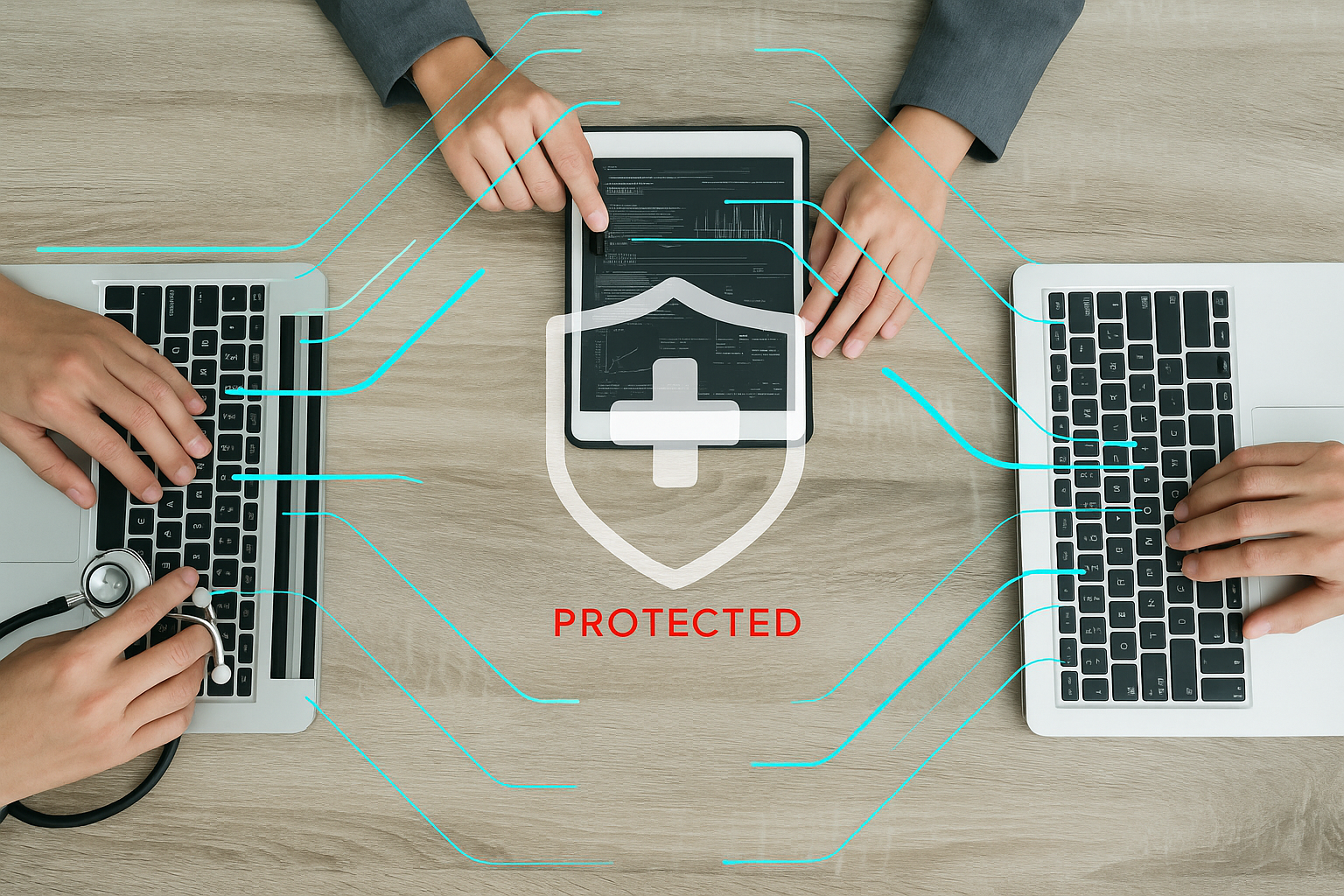5 Essential Cybersecurity Measures for Healthcare Organizations

Protecting patient data is critical for healthcare providers. With the increasing digitization of medical records and the rise in cyber attacks targeting healthcare organizations, implementing robust cybersecurity measures has never been more important.
Healthcare organizations are prime targets for cybercriminals due to the valuable patient data they store. According to recent studies, the healthcare industry experiences more cyber attacks than any other sector, with a 55% increase in attacks in 2024 alone. The consequences of a data breach can be devastating, including financial losses averaging $9.2 million per incident, severe damage to reputation, and most importantly, compromised patient care that can put lives at risk.
1. Implement Multi-Factor Authentication (MFA)
Passwords alone are no longer sufficient to protect sensitive medical data. Multi-factor authentication adds an essential layer of security by requiring users to provide two or more verification factors to gain access to resources. This significantly reduces the risk of unauthorized access even if passwords are compromised.
For healthcare organizations, MFA should be implemented across all systems containing patient data, including electronic health record (EHR) systems, email accounts, and administrative portals. This simple yet effective measure can prevent up to 99.9% of account compromise attacks according to Microsoft's security research team.
When implementing MFA, consider these healthcare-specific best practices:
- Use biometric authentication where possible for clinical workstations
- Implement proximity-based authentication for shared clinical devices
- Ensure MFA solutions comply with HIPAA requirements
- Create emergency access protocols for critical care situations
- Regularly audit MFA logs for suspicious access patterns
2. Regular Security Training for Staff
Human error remains one of the biggest cybersecurity vulnerabilities in healthcare. Regular security awareness training helps staff recognize phishing attempts, social engineering tactics, and other common attack vectors. Training should be conducted at least quarterly and include simulated phishing exercises to test effectiveness.
Topics should cover safe email practices, proper handling of patient information, secure use of mobile devices, and the importance of reporting suspicious activities promptly. Remember that well-trained staff are your first line of defense against cyber threats.
Effective healthcare security training programs should include:
- Role-based training tailored to clinical vs. administrative staff
- Scenario-based exercises using healthcare-specific examples
- Training on recognizing medical device tampering
- HIPAA compliance and breach reporting procedures
- Secure telehealth practices for remote patient care
3. Endpoint Protection and Management
With the proliferation of devices in healthcare settings—from workstations and tablets to medical IoT devices—endpoint protection is crucial. Comprehensive endpoint security solutions should include antivirus software, device encryption, application control, and automated patch management.
Healthcare organizations should maintain an inventory of all devices connected to their network and ensure each device meets security standards. Unauthorized devices should be automatically detected and blocked from accessing sensitive resources.
Modern healthcare endpoint protection should address:
- Medical IoT device security and monitoring
- Biomedical equipment protection
- Clinical workstation lockdown and application whitelisting
- Mobile device management for clinician tablets and smartphones
- Secure remote access for telehealth providers
4. Regular Security Assessments and Penetration Testing
Proactive security assessments help identify vulnerabilities before they can be exploited. Healthcare organizations should conduct regular vulnerability scans and annual penetration tests to evaluate their security posture from an attacker's perspective.
These assessments should cover network infrastructure, web applications, wireless networks, and physical security controls. Findings should be prioritized based on risk level, and remediation plans should be developed and implemented promptly.
Healthcare-specific security assessments should include:
- Medical device vulnerability testing
- EHR and clinical application security assessment
- HIPAA compliance gap analysis
- Telehealth platform security evaluation
- Physical security assessment of clinical areas
5. Comprehensive Backup and Disaster Recovery Plan
Ransomware attacks targeting healthcare organizations have increased dramatically in recent years, with hospitals accounting for 48% of all ransomware incidents in the healthcare sector. A robust backup and disaster recovery plan is essential to ensure continuity of care in the event of a successful attack.
Implement the 3-2-1 backup strategy: maintain at least three copies of critical data, store them on two different types of media, with one copy stored off-site. Regularly test backup restoration procedures to ensure they work when needed. Your disaster recovery plan should include detailed procedures for maintaining essential services during a cyber incident.
Healthcare disaster recovery plans should address:
- Critical patient care systems recovery prioritization
- Offline clinical procedures during system outages
- Backup medical device configurations
- Emergency access to patient records
- Communication protocols during cyber incidents
Conclusion
Cybersecurity in healthcare is not just about protecting data—it's about protecting patients. By implementing these five essential measures, healthcare organizations can significantly reduce their risk of a successful cyber attack and ensure they can continue providing quality care even in the face of evolving threats.
At IT Launch, we specialize in providing comprehensive cybersecurity solutions tailored specifically for healthcare organizations. Our team understands the unique challenges of securing medical environments while maintaining compliance with regulations like HIPAA.
Contact us today to learn how we can help your organization implement these essential cybersecurity measures and protect your patients' data and your organization's reputation.